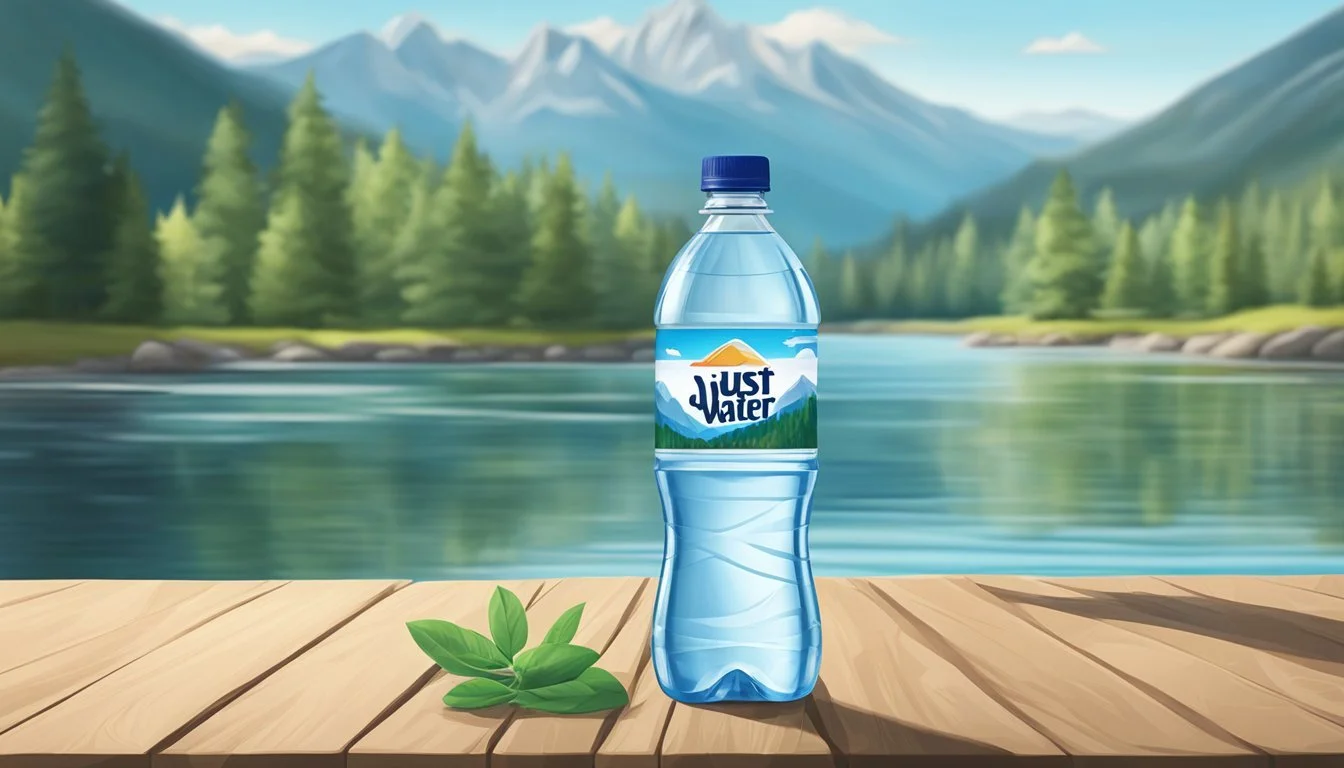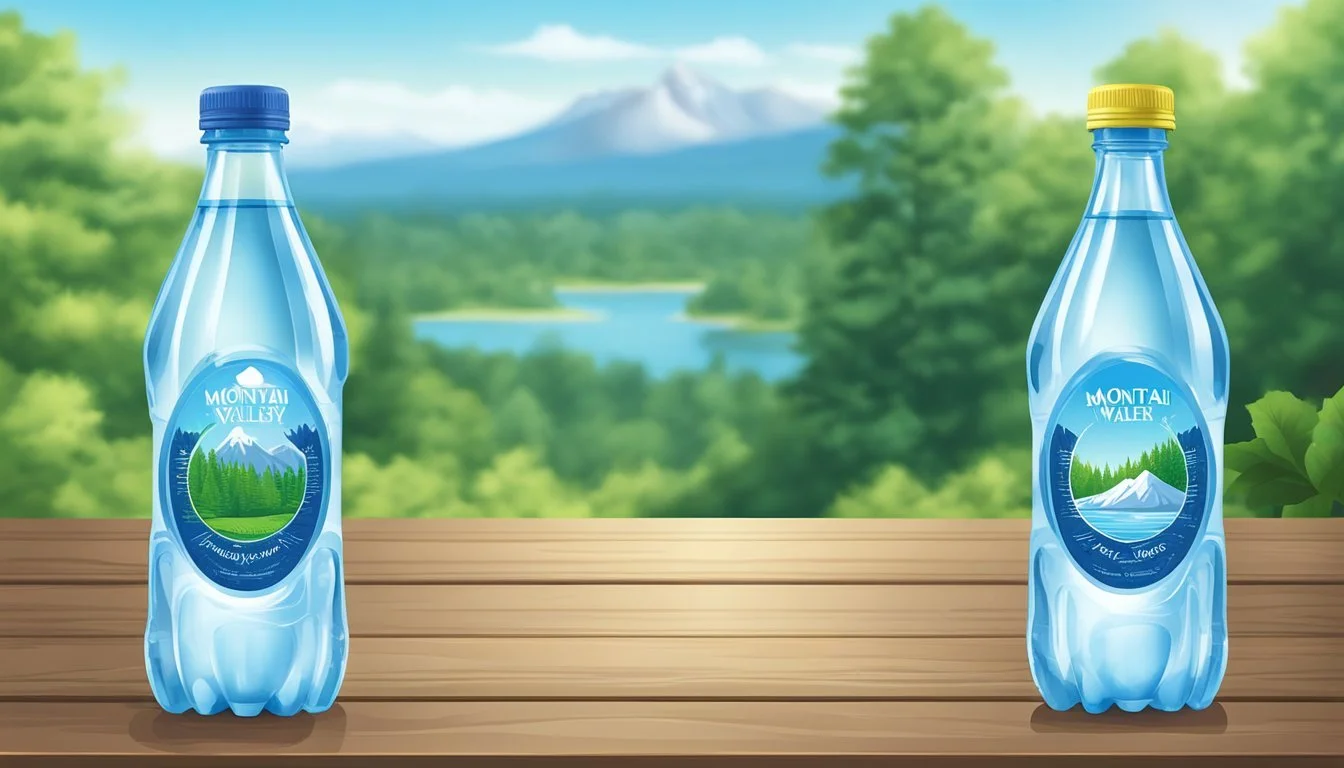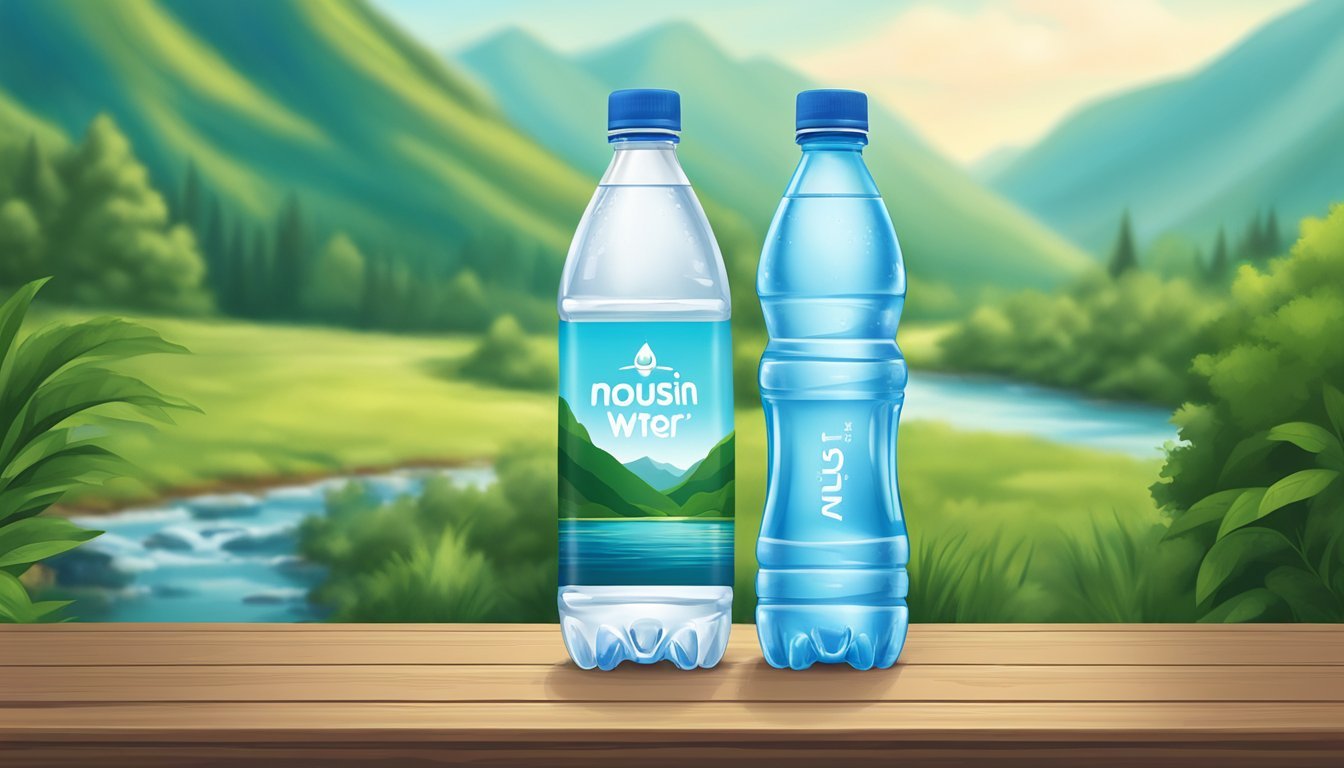Just Water vs. Mountain Valley Spring Water
An Unbiased Comparison of Bottled Water Brands
When selecting a bottled water, consumers consider factors such as taste, purity, and environmental impact. Just Water and Mountain Valley Spring Water are two brands that stand out in the market, each with its own unique selling points. Just Water prides itself on its eco-friendly packaging and ethically sourced spring water, aiming to offer a product that is good for both the consumer and the planet. On the other hand, Mountain Valley Spring Water is known for its long heritage, having provided natural spring water since 1871, with a focus on quality and taste.
The source of the water is an essential aspect for many consumers; Just Water is sourced from a spring in the Adirondack Mountains of upstate New York, while Mountain Valley Spring Water originates from the Ouachita Mountains of Arkansas. The eco-conscious packaging of Just Water, which is made from 82% renewable resources, often appeals to environmentally aware customers, whereas the premium quality and mineral content of Mountain Valley Spring Water attract those who prioritize taste and health benefits.
A comparison of Just Water and Mountain Valley Spring Water requires a look into their environmental stewardship, health benefits, mineral content, pH levels, taste, and how these factors resonate with consumers' values and preferences. Both brands offer distinct advantages, and understanding these can help consumers make an informed choice according to what they value most in their bottled water.
Understanding Bottled Water
When exploring the world of bottled water, consumers encounter a broad spectrum of options, each distinguished by sourcing, treatment, and content variations.
Definition and Overview
Bottled water refers to drinking water packaged in plastic or glass containers. It comes from various sources, including but not limited to, natural springs, artesian wells, or municipal supplies. Bottled water must meet stringent regulatory standards for safety and quality. Unlike tap water, bottled water is designed for convenience and often undergoes additional filtration or purification to meet regulatory requirements and consumer preferences.
Types of Bottled Water
There are several types of bottled water, each defined primarily by its source and treatment process:
Spring Water: Typically sourced directly from an underground formation from which water flows naturally to the surface. Natural spring water is often minimally treated, maintaining its natural mineral content.
Mineral Water: Originates from a geologically and physically protected underground water source. It contains no less than 250 parts per million total dissolved solids (TDS), and the minerals and trace elements must come from the source naturally without human intervention.
Purified Water: Water that has been processed to remove chlorine and other impurities. It includes water from any source but must meet the same standards set by public water systems. This category includes distilled water, which is vaporized and condensed, and deionized water, where ions are removed through a chemical process.
Alkaline Water: This is water with a higher pH level than tap water, generally above 7, and it’s believed by some to neutralize acid in the bloodstream. However, health claims associated with alkaline water are not widely supported by reputable scientific studies.
Artesian Water or Artesian Well Water: Comes from a well that taps a confined aquifer—a water-bearing underground layer of rock or sand in which the water level is above the top of the aquifer.
Each type offers differences in taste and mineral content, allowing consumers to choose water based on personal preference or perceived health benefits. However, whether one type is categorically "better" than another can be subjective and is debated among experts and consumers alike.
Water Sources and Origins
The quality and taste of bottled water are greatly influenced by its source and the natural filtration processes it undergoes. Here we examine the distinct origins of Just Water and Mountain Valley Spring Water, focusing on the aquifers and natural springs that provide their foundation.
Exploring Spring Water Origins
Mountain Valley Spring Water hails from a source nestled in the Ouachita Mountains of Arkansas. The water is sourced from a natural spring that is fed by rainwater slowly filtering through layers of volcanic rock and limestone. This geological composition enriches the water with a variety of minerals such as calcium, magnesium, and potassium, which contribute to the water's reputed taste and quality.
Just Water, on the other hand, sources its natural spring water from the Adirondack Mountains in New York State. The water works its way through the earth and rock before being harvested, gaining a unique blend of minerals in the process. Through its journey, Just Water accrues a balanced mineral content that influences its taste and purity.
How Aquifers Impact Taste and Quality
The taste and quality of bottled water are directly linked to the characteristics of the aquifers from which they are drawn. An aquifer is a body of permeable rock that can contain or transmit groundwater. When it comes to Mountain Valley Spring Water, the water is collected from a protected aquifer that is responsible for imparting a natural filtration process. This natural filtration contributes to a low total dissolved solids (tds) level which is a measure of the combined content of all organic and inorganic substances contained in a liquid.
Just Water benefits from a similar natural filtration process, as the water is gathered from an aquifer where it is organically filtered and infused with minerals. This results in a distinct mineral profile that is key to its taste and a tds level that ensures both purity and richness in flavor.
Both brands credit their sources with providing not just the water itself, but also the natural processes that ensure the water's high quality. This natural pathway handles the delicate balance of minerals that defines the taste and health benefits associated with their respective bottled waters.
Quality and Purity
In the comparative analysis of Just Water and Mountain Valley Spring Water, understanding the quality and purity of these bottled water brands is paramount. Both brands purport high standards for mineral content and health benefits, as well as rigorous filtration processes to ensure purity.
Assessing Mineral Content and Health Benefits
Just Water touts its naturally high pH and its beneficial mineral content. It sources its water from a sustainable aquifer, where the water is naturally infused with a balance of calcium, magnesium, and potassium – minerals essential to human health that can enhance hydration by contributing to the water's electrolyte content.
Mountain Valley Spring Water, with its source dating back to 1871, also boasts a rich mineral profile, delivering a high content of calcium, magnesium, and an optimal level of potassium. This spring water maintains a pH between 7.3 to 7.7, striking a balance that is believed to be beneficial for the body's pH level.
Contaminants and Filtration Processes
Concerning contaminants, both companies emphasize their commitment to purity. Just Water employs a filtration process, including UV light treatment and ozone treatment, to eliminate potential contaminants like bacteria and chlorine. The brand prides itself on using a paper-based bottle with a plant-based cap to further reduce potential chemical leaching.
Mountain Valley Spring Water, on the other hand, highlights its natural filtration through the earth's layers, which naturally purifies the water while enriching it with minerals. To ensure additional purity, the brand employs environmentally-friendly practices along with filtration and ozonation methods. This thorough processing helps to remove unwanted contaminants such as lead and ensures the water meets stringent quality standards.
Environmental Impact
In assessing the environmental impact of Just Water versus Mountain Valley Spring Water, one must consider the sustainability practices each company employs, as well as their efforts in source protection and management. These factors are crucial in determining their environmental footprint and commitment to providing safe and clean drinking water.
Sustainability Practices
Just Water prides itself on packaging made primarily from paper, sourced from responsibly managed forests. A significant component of their boxed water is constructed using 54% paper and 28% plant-based plastic, emphasizing renewable resources. These cartons are recyclable, promising a lower environmental impact than traditional plastic bottles.
Mountain Valley Spring Water, on the other hand, offers its products in glass bottles as well as BPA-free plastic options. Glass packaging can be recycled indefinitely and doesn't degrade in quality, making it an environmentally friendly choice. Nevertheless, transporting glass bottles generates a larger carbon footprint compared to lighter materials.
Source Protection and Management
The sourcing of water for both companies comes from natural springs, which necessitates diligent aquifer management to prevent depletion or contamination. Mountain Valley Spring Water is drawn from a natural spring in Arkansas, and they assert that their water contains beneficial minerals with low contaminant levels that meet FDA standards. Their extraction practices are designed to minimize environmental disturbance and safeguard the spring's longevity.
Just Water sources its water from a spring in upstate New York, where it is committed to protecting the local ecosystem. Their extraction methods aim to maintain the natural aquifer levels, ensuring a sustainable supply of clean drinking water. By taking these steps, Just Water demonstrates its dedication to environmental stewardship and sustainable practices.
Taste and pH Levels
The pH level and mineral content of bottled water significantly affect its taste. This section will compare Just Water and Mountain Valley Spring Water based on these criteria.
The Influence of pH and Mineral Balance on Taste
pH levels in water impact taste; a neutral pH of 7 is considered tasteless. Bottled water typically ranges from slightly acidic to slightly alkaline, with ideal drinking water pH levels being between 6.5 and 8.5, making the water taste balanced. Mineral content also plays a crucial role; higher mineralization can lead to a distinct taste, often described as refreshing or flat, depending on the balance of minerals such as calcium, magnesium, and potassium.
Comparing Just Water and Mountain Valley Spring Water
Just Water stands out with its naturally alkaline pH level, which is due to the source's unique mineral content. Its pH typically hovers around the higher end of the ideal range, which can enhance its taste with a slight mineral flavor. This characteristic positions Just Water as a preferred option for those seeking a fresher taste with a hint of minerals.
On the other side, Mountain Valley Spring Water has been reported to have a pH of 8.5, which is also within the desirable range for drinking water and implies a marginally acceptable and harder water due to its TDS (total dissolved solids) levels. The natural spring water source gives it a crisp taste refined by the surrounding environment's geological composition.
Both brands have sought after taste profiles, largely influenced by their respective source water's pH levels and mineral contents, offering distinct experiences for consumers.
Packaging and Branding
The competition between Just Water and Mountain Valley Spring Water extends beyond the water quality to the distinct packaging and branding strategies that each brand employs. The visual and material components of their bottles play a pivotal role in shaping consumer perceptions and choices.
The Role of Bottles in Brand Image
Just Water is known for its eco-friendly approach, utilizing a rectangular paper-based carton with a plant-based cap. This reflects its commitment to sustainability. It's not just the materials but the striking design that stands out on the shelves, reinforcing a brand image that resonates with environmentally conscious consumers.
Mountain Valley, on the other hand, offers its premium water in classic glass bottles, which not only preserve taste but also exude a sense of tradition and purity. The use of glass bottles aligns with its award-winning heritage and emphasizes a premium branding strategy. The choice of material here is key; glass bottles are often associated with superior quality in the minds of many consumers.
Marketing Strategies of Leading Brands
Just Water and Mountain Valley deploy different marketing strategies that align with their branding.
Just Water leans on its environmental initiatives and sustainability. The brand often highlights its reduced carbon footprint and the ethical sourcing of its materials, which creates a compelling narrative for socially responsible audiences.
Mountain Valley positions itself as an iconic American brand with deep roots. Its marketing campaigns emphasize its long history of providing pure, natural spring water since 1871, appealing to those who value tradition and legacy.
Both brands utilize their distinctive bottle designs as a cornerstone in their marketing tactics, leveraging the visual impact to create brand recall and appeal to their respective target markets.
Health Considerations
When selecting a bottled water, consumers often weigh health benefits, such as hydration efficiency and the presence of naturally occurring electrolytes. The section below explores the health considerations between Just Water and Mountain Valley Spring Water, focusing on hydration and electrolyte balance, as well as the validity of the health claims made by these brands.
Hydration and Electrolyte Balance
Both Just Water and Mountain Valley Spring Water can provide adequate hydration, which is essential for bodily functions. The presence of electrolytes in water can enhance hydration by replenishing essential minerals lost through sweat. Mountain Valley Spring Water is known for its naturally occurring minerals, which include calcium, magnesium, and potassium. These minerals are important for maintaining electrolyte balance in the body.
Just Water, on the other hand, states that their water has a high pH and contains a balance of electrolytes. While they offer an alkaline water, it's important to note that the benefits of alkaline water are subject to debate among health professionals.
Assessing the Health Claims of Bottled Water Brands
It is important to scrutinize health claims made by bottled water brands. Mountain Valley Spring Water claims that their product is rich in essential minerals. These minerals are indeed beneficial for health and can be a contributing factor in choosing a bottled water.
Meanwhile, Just Water purports health benefits associated with alkaline water, which are not universally accepted in the scientific community. Consumers should be aware that while both brands can aid in hydration, health benefits related to pH levels or enhanced mineral content require more research for conclusive evidence.
When considering hydration and health, it is vital to look beyond marketing claims and focus on the specific needs of one's diet and lifestyle.
Comparative Analysis
In this section, the focus is on evaluating Just Water and Mountain Valley Spring Water across two axes: their price points, availability, and consumer preferences, followed by their ranking and reviews in the public domain.
Price, Availability, and Consumer Preference
Just Water is known for its eco-friendly packaging and sustainable sourcing. Typically, it is priced affordably and is available in a number of retail stores and online marketplaces, making it accessible to a broad audience. Consumers who prioritize environmental impact often prefer Just Water.
Mountain Valley Spring Water, on the other hand, is often perceived as a premium brand. Although it may be higher in price compared to Just Water, it offers natural spring water that is rich in minerals. Availability can vary but it's generally found in specialty food stores and can be ordered online. Consumers who value natural mineral content and taste often lean towards Mountain Valley Spring Water.
Ranking and Reviews
Discussing rankings, Mountain Valley Spring Water has received accolades, including being named "Best Tasting Water in the World" multiple times at the Berkeley Springs International Water Tasting competition. Individual reviews often cite its balanced pH and superior taste.
Just Water has not been ranked as prominently in taste competitions like Berkeley Springs, but it garners positive reviews for its brand philosophy and commitment to sustainability. Consumers often mention the influence of the brand's ethical sourcing and packaging on their purchasing decision, with the taste being pleasantly acceptable.
Both brands have carved niches that relate to different consumer values: Just Water excels in sustainability and affordability, while Mountain Valley Spring Water stands out for its taste and mineral content.
Regulatory Standards
Both Just Water and Mountain Valley Spring Water are subject to stringent regulatory standards that ensure the safety and quality of bottled water. Compliance with these regulations is non-negotiable for bottled water companies.
Compliance with FDA and EPA Guidelines
The Food and Drug Administration (FDA) sets the federal standards for bottled water quality. Just Water and Mountain Valley Spring Water must comply with these standards, which include limits on contaminants and require proper labeling. These standards are as stringent as the Environmental Protection Agency's (EPA) standards for tap water. The EPA enforces the Safe Drinking Water Act, although its direct regulation applies to public water systems rather than bottled water.
FDA Regulations: Standards of Identity, Quality, and Good Manufacturing Practices.
EPA Safe Drinking Water Act: Establishes protective legal thresholds for water contaminants.
International Standards and Certifications
Mountain Valley Spring Water has received recognition at the Berkeley Springs International Water Tasting, a clear indication of its excellence in terms of water quality. This event is a well-respected forum that awards high-quality waters from around the globe. Winning an award at this competition suggests that Mountain Valley meets and possibly exceeds international quality standards for taste and purity.
Berkeley Springs International Water Tasting: A reputed platform for distinguishing high-quality bottled waters.
International Recognition: Implies adherence to globally recognized water quality standards.
Conclusion
When pitting Just Water against Mountain Valley Spring Water, consumers have distinct choices based on taste, sustainability, and quality. Just Water is commended for its eco-friendly approach, utilizing a paper-based bottle which can reduce plastic waste. Its water source is ethically managed, and it provides a clean taste with a neutral pH ideal for regular consumption.
On the other hand, Mountain Valley Spring Water is renowned for its natural mineral content and taste. Harvested from a protected spring in the Ouachita Mountains, its quality is reflected in the numerous awards it has garnered over the years.
Here's a brief comparison:
Aspect Just Water Mountain Valley Spring Water Taste Neutral, clean Natural minerals, distinctive Sustainability Eco-friendly packaging Traditional plastic and glass Quality Ethically sourced Award-winning, naturally mineralized
Consumers may prefer Just Water for its environmental impact and the company's commitment to sustainability. If the priority is a rich mineral profile and a storied legacy of quality, Mountain Valley Spring Water might be the preferable choice. It ultimately depends on a person's values and palate preferences. Each brand serves its audience with commitment to purity and consumer satisfaction, making the decision a personal one, rather than a question of superiority.






